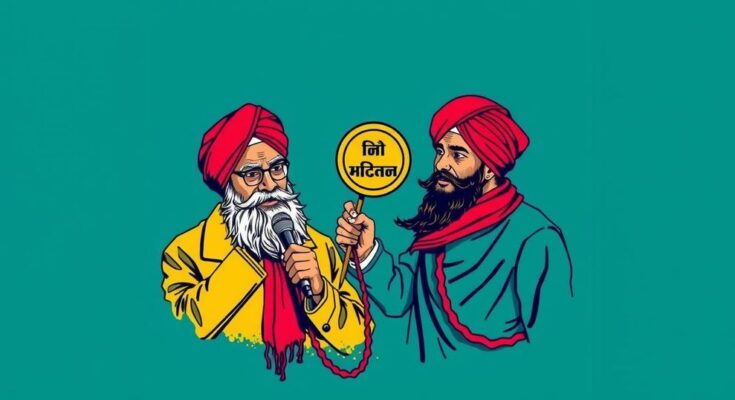Shafi Burat, the JSMM Chairman, has formally appealed to the foreign ministers of 119 countries for support in achieving Sindh’s independence, highlighting severe human rights violations, cultural erasure, and economic exploitation under Pakistan’s government. He warns of systemic violence, the indoctrination of youth, and calls attention to Pakistan’s role in supporting extremist groups. Burat ultimately demands international recognition of Sindh’s right to self-determination.
In a daring and historic appeal, Shafi Burat, the Chairman of the Jeay Sindh Muttahida Mahaz (JSMM), has reached out to the foreign ministers of 119 nations to advocate for the independence of Sindh, also known as Sindhudesh. This urgent letter highlights the myriad grievances—political, economic, and cultural—that the Sindhi people endure under the governance of Pakistan, which Burat denounces as a reckless and oppressive regime. Opening with an urgent call for global awareness, Burat details the dire situation faced by the Sindhi population, alleging that they are subjected to severe human rights violations and an ongoing campaign of terror from the Pakistani state. Burat asserts that the rich tapestry of Sindhi culture, rooted in the ancient Indus Valley Civilization, is under assault, rendered vulnerable by what he characterizes as Pakistan’s “forced occupation and slavery.” In his impassioned plea, he brands Pakistan as a rogue nation, notorious for sponsoring terrorism both domestically and across borders. He cites the nation’s backing of extremist organizations like the Haqqani Network and Al-Qaeda, drawing a vivid picture of a landscape rife with violence and turmoil. The letter goes on to enumerate the alarming reports of state-sponsored violence, alleging that Pakistan’s military and intelligence apparatus systematically targets political activists for forced disappearances and extrajudicial killings. Burat raises an eyebrow to Pakistan’s military activities, especially concerning the potential storage of nuclear weapons in Sindh, invoking images of shadowy tunnels tucked away in the mountains, creating a chilling sense of environmental and human peril. The narrative unfolds further as Burat shines a light on a cultural genocide at play, where over 35,000 Islamic madrassas are purportedly being funded by the Pakistani state, seeking to indoctrinate and reshape the minds of Sindhi youth. He warns that this aggressive campaign not only threatens the essence of Sindhi culture but aims to obliterate its secular, democratic roots. Turning his focus to economic exploitation, Burat criticizes the much-debated China-Pakistan Economic Corridor (CPEC), likening it to neocolonialism that exacerbates the marginalization of the Sindhi people. He passionately implores the international community to interrogate why these projects, fraught with controversy, are being propelled without the consent of the Sindhi and Balochistan populations, despite their vocal opposition. In conclusion, Burat’s letter culminates in a pressing demand for global acknowledgment of Sindh’s right to self-determination. He urges international bodies, including the UN and key world powers, to take decisive action against Pakistan’s alleged support for terrorism, its appropriation of Sindhi resources, and the brutal suppression of the Sindhi peoples’ rights.
The ongoing struggle for Sindhi self-determination is deeply rooted in historical grievances against Pakistani governance, where cultural erosion and economic exploitation have become common narratives among the Sindhi people. The region, known for its rich heritage linked to the ancient Indus Valley Civilization, continues to grapple with human rights abuses. As political tensions escalate, the JSMM has emerged as a key player calling for international attention and action to support the Sindhi cause and alleviate the plight faced by its people.
Burat’s compelling presentation to the international community encapsulates the desperation of the Sindhi people’s plight—an indomitable call for freedom and self-determination. His allegations concerning human rights abuses, military transgressions, and cultural erasure point to a dire need for global scrutiny of Pakistan’s actions. This bold outreach serves as a clarion call for justice, demanding recognition and intervention to protect the rich legacy and rights of the Sindhi populace.
Original Source: thenewsmill.com



